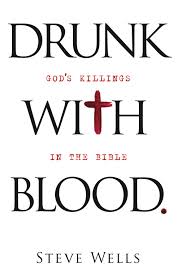Do you struggle with the Bible? Do you wrestle with what it says, what it means, and how to apply it to your life?
Confession time…
I do.
Here’s another confession….
When it comes to helping me understand what to do with Scripture, Bible college and seminary didn’t help me much. In fact, some days, I wonder if Bible College and Seminary hindered more than they helped.
We have probably all had run-ins with Christians who like to condemn others (or condemn you) by saying, “The Bible says it; I believe it; that settles it.”
Okay, here’s another confession…
 I used to be one of those Christians. I used to preach that very thing.
I used to be one of those Christians. I used to preach that very thing.
Anyway, the only thing that Bible College and Seminary really did for me was giving a more “scholarly” way of saying, “The Bible says it; I believe it; that settles it.”
We were trained to talk about the Greek and Hebrew, and to reference the cultural, historical, and grammatical contexts of whatever passage were were studying, thereby giving us more and better ammunition against those with whom we disagreed.
In the end though, it all boiled down to the same thing…
Though the uneducated masses say, “The Bible says it; I believe it; that settles it!” I could now say, “The Hebrew says this, the cultural background study backs it up, therefore, I believe it, and you better not disagree with me, you ignorant and uneducated worm!”
Anyway, I have begun to try to back away from that sort of approach to Scripture, mostly because it looks nothing like Jesus, and have begun to try to figure out what the Bible is, how it should be used, and how it should be read, taught, and applied to our lives.
The Bible Tells Me So
So it was with great interest that I recently picked up The Bible Tells Me So, by Peter Enns. I had previously read his book, Inspiration and Incarnation, and found it extremely helpful, and so decided to read this newest book of his as well.
As with everything Dr. Enns writes, this book was full of deep insights and helpful ideas about the nature and authority of Scripture. What surprised me most about this most recent book, however, was the keen sense of humor that was displayed on every page. There were numerous places where I laughed out loud at what I was reading. Dr. Enns has a very good sense of humor!
Humor is important for a book like this, where so much of what is foundational to many forms of modern Christianity is being challenged.
In The Bible Tells Me So, Peter Enns attempts to present an approach to Scripture which allows for us to accept that it has historical and scientific errors and that it contradicts itself at various places, and yet still retain the Bible as an important witness to the theological and spiritual struggles which were faced by our forefathers in the faith, and more importantly, as a historical document about the life of Jesus and how the death and resurrection of Jesus resulted in the transformation of the first century mediterranean world.
Reading over that paragraph again, I am pretty sure that Peter Enns would not agree with how I phrased everything in there…
…Maybe it is best to say this: Peter Enns wants us to stop agreeing with the Bible in everything it says, and instead, begin arguing with God about what is in the Bible. That, he says, is the purpose of Scripture. He says that if the Bible teaches us anything about God, it is that we learn about God and develop a relationship with Him, not by simply accepting everything the Bible says, but by actually engaging with God in a spirited (both senses of the word are intended there) discussion about the Bible.
In other words … don’t be this guy…
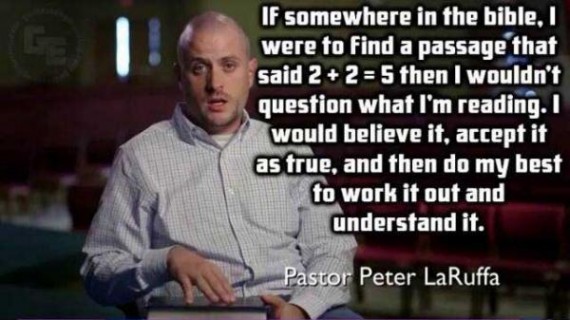
Frankly, I really, really like this approach, because (as you may know if you have been reading my blog for the past six years or so), this is all I have been able to do with Scripture for the past decade or so. Despite all my training and education, I still cannot make heads or tails of the Bible. If Peter Enns is right, this is exactly how God wants it!
Though not directly stated anywhere, Peter Enns appears to be a proponent of the idea that the Bible is a library of books written by various authors from various theological perspectives, who are in dialogue with each other over the nature of God and what the human response to Him should be. Others who hold this view say that rather than the Bible being “uni-vocal,” it is “multi-vocal.” That is, rather than speaking with one voice on various topics and subjects, there are numerous voices, and sometimes they disagree with and even contradict one another.
In The Bible Tells Me So, Peter Enns begins by showing that most of the traditional approaches to the Bible don’t match up with what the Bible actually appears to be. Following this, he goes through several sections of the Bible, forcing us to read it and see it in a way that you probably won’t hear in most seminaries, churches, or home Bible studies. Then, the book concludes with some explanation of how Jesus, Paul, and the apostles used Scripture, and what we should do with the Bible as it is.
Frankly, this book is going to require a second read for me, and I plan on reading it out loud to my wife. She is a better theologian than I am, and I trust that she will have discernment to see the right (and wrong) with what Peter Enns has written. I figure that if he invites us to argue with God about the Bible, he will not mind too much if my wife and I argue with him…
For now, though, here is my one main reservation about what Peter Enns has written (I have many reservations about the book …. please don’t read my review as a glowing endorsement)…
The problem with the approach of Peter Enns in The Bible Tells Me So is not so much in what he says, but in the logical ramifications of what he says.
For example, he says that the Bible teaches us about Jesus (p. 237). But does it? If large chunks of Scripture are stories that have been fabricated to answer the pressing social and theological questions of the author’s day (pp. 75, 94, 105, 107-130, etc.), why could this not also have been true about the stories of Jesus? This is especially true if the Gospel authors were not actually eyewitnesses to Jesus (as Enns believes – p. 78).
Ultimately, if Enns is right, the Bible is little more than the best-selling piece of historical literature of all time. Is it inspiring? Yes! Interesting? Sure! Can it guide us in our own life and with our own questions? You bet! Is it life changing? It can be. But is it really from God? Not so much.
 Look, this approach to Scripture is way better than the fundamentalist approach where we carry out all manner of atrocities in Jesus’ name. But I just struggle with having a Bible like this. If Enns is right, what sets the Bible apart from other religious books? How can it be authoritative at all? How can it be reliable or trustworthy in what it says about anything?
Look, this approach to Scripture is way better than the fundamentalist approach where we carry out all manner of atrocities in Jesus’ name. But I just struggle with having a Bible like this. If Enns is right, what sets the Bible apart from other religious books? How can it be authoritative at all? How can it be reliable or trustworthy in what it says about anything?
In the end, I highly recommend you buy and read The Bible Tells Me So. I recommend it, not because I agree with everything that is written (though in time, maybe I will!), but because the book made me think. This is the best kind of book! I like books that make me think, even when I disagree.
Hmmm…. maybe that is what the Bible is after all….
Until then, what sort of issues do you have with Scripture? Do you think that the approach of Peter Enns (according to my woefully inadequate summary above) could provide a way of escape from your problems with the Bible? Or do you think his approach simply creates more (and greater) difficulties? Let me know in the comment section!

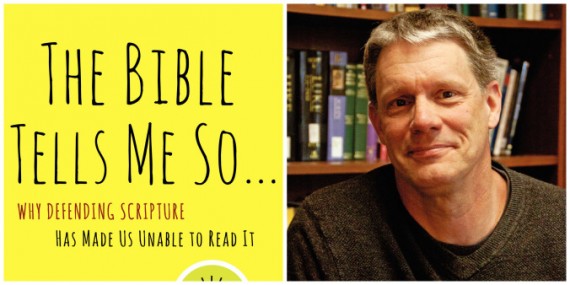
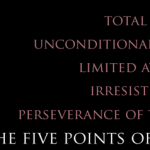
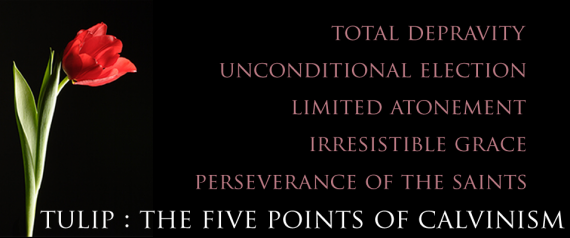


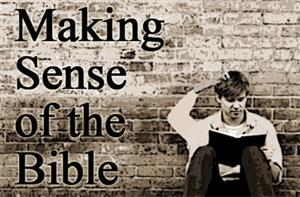 As I finished the book, it gave me a new hope that the Bible is for today, and that God can speak to me through the pages of Scripture. Yet it did this by arguing against the traditional doctrines of inspiration and inerrancy, showing that the way these doctrines are taught today was not the way they were understood in the early church, and is not even what Scripture says about itself. Yet this does not mean the Bible not inspired, or that the Bible is hopelessly full of errors and cannot be trusted. Far from it, Adam Hamilton shows how we can trust the Bible, and how the Holy Spirit breathes life into the Bible so that we can understand it for today.
As I finished the book, it gave me a new hope that the Bible is for today, and that God can speak to me through the pages of Scripture. Yet it did this by arguing against the traditional doctrines of inspiration and inerrancy, showing that the way these doctrines are taught today was not the way they were understood in the early church, and is not even what Scripture says about itself. Yet this does not mean the Bible not inspired, or that the Bible is hopelessly full of errors and cannot be trusted. Far from it, Adam Hamilton shows how we can trust the Bible, and how the Holy Spirit breathes life into the Bible so that we can understand it for today. 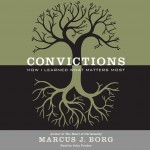
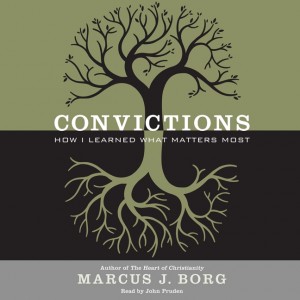
 Among his convictions which Marcus Borg explains in his book is the idea that salvation is about way more than just going to heaven when we die. As I have argued for years, the Gospel is about all of life, not just what happens to us after death. Salvation is not just about how we will live in the hereafter, but also how we live in the here and now.
Among his convictions which Marcus Borg explains in his book is the idea that salvation is about way more than just going to heaven when we die. As I have argued for years, the Gospel is about all of life, not just what happens to us after death. Salvation is not just about how we will live in the hereafter, but also how we live in the here and now.
